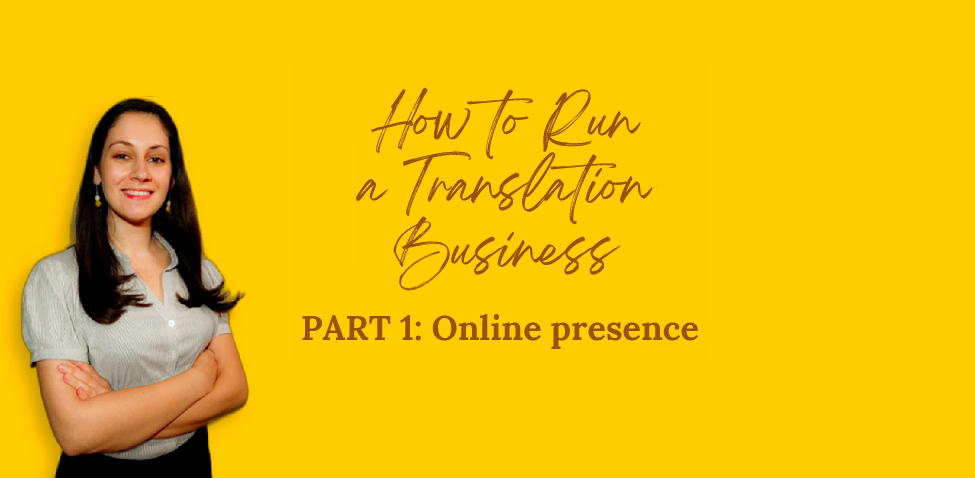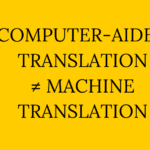
How to Run a Translation Business PART 1: Online presence
As you requested, I have gathered my tips for running a translation business in one place, the How to Run a Translation Business Series.
It’s divided into five parts, each of which touches on a different aspect: online presence, content, clients, finances, and mindset. As you will see, some parts alternate with the others. For example, online presence mentions content and clients; finances are connected with clients and mindset; and mindset is connected with all of them.
This is the first part of this series and covers online presence.
1. Be visible online
In the era of the Internet, it’s a must. And it will make it so much easier for your potential clients to find you. Have a website, a LinkedIn profile, a podcast, a YouTube channel, etc., and share content regularly so that your potential clients hear about you every now and then.
2. Don’t force yourself to anything
You don’t like being on camera? That’s OK. You don’t have to make videos. If you’re an introvert or shy, find other ways of marketing yourself that you like. And who knows—maybe after some time you’ll be so into hosting a live event that you will try it? 😉
3. Show up constantly
You shouldn’t force yourself to market your translation services in ways you don’t feel comfortable with. But you MUST show up, and show up on a regular basis. Unless you do it, how can your potential clients find out about you?
Why do I say “on a regular basis” instead of giving you a specific answer—3-4 days per week, for example? Because there are different opinions on how often to show up, and it also depends on your current situation.
Some say that, ideally, you should show up every day for at least 10 minutes a day, and that you should post on LinkedIn 3–5 times a week. But there are people who show up and post less and still get clients. It’s because of their expertise, their niche, or having an optimized LinkedIn profile.
Once you have an established network of clients who regularly send you translation projects, you may not need to or want to market yourself so often. And if the projects are coming constantly, you won’t even have time for that.
However, even in that case, you should remember to show up from time to time. Why? In case one of your most profitable clients stops working with you for some reason, a new client may contact you right away.
4. Be authentic
Show yourself as you are; don’t pretend anything. From how you speak, what topics you talk about to what you like doing in your free time.
The clients want to know the real you. This will help them see you as a person and connect with you emotionally. They will be more likely to trust you and hire you then.
5. Be where your potential clients are
Do a research to know on which social media platform your potential clients hang out. Although LinkedIn is the best platform for translators to find clients, it may be that a specific group of your clients doesn’t use it. Do they prefer Facebook then? Instagram? Or TikTok maybe? It all depends on your client’s type and the field they work in.
Once you know it, market your services there to let your clients know about you.
Show up regularly and be active at least 10 minutes a day. Post. Engage with your ideal clients’ content. Connect with them. Start natural conversations. Share valuable content.
6. Always keep your WHO and WHY in mind
Know who you want to reach (your ideal clients) as well as why you do what you do (your mission & values) and what you want to be known for (your specialization). It should be reflected in everything you do.
Let’s dive into each of these a little more.
YOUR IDEAL CLIENTS are clients you want to work with the most. Depending on your specialization, they can be legal firms or lawyers, marketing agencies, sports brands, accountants, manufacturers, international tech companies, NGOs, etc., as well as LSPs.
YOUR MISSION AND VALUES:
As a translator, do you care about human rights?
Are you against testing cosmetics on animals?
Or maybe you pay attention to using inclusive language in ads, social media, TV, radio, books, etc.?
YOUR SPECIALIZATION, also called YOUR NICHE:
- You want to be the first translator to come to your client’s and/or fellow translator’s mind when someone says “legal documents”? Because you’re passionate about law and/or you hold an MSc in Law.
- It’s not your cup of tea, and you’d rather work on technical documents like patents?
- Or you see yourself translating marketing materials or medical protocols?
Whatever you choose, make sure you clearly state it everywhere. Literally everywhere. On your website, your LinkedIn profile, and other social media platforms. In your newsletter if you have one, your social media content, etc.
7. Always provide your clients with value
Share your knowledge with them and showcase your expertise. Write about your niche, the projects you have done, share interesting facts related to your field, etc.
Talking to your clients about how to do business with you is also important. That way they know what they can expect from you.
But above all, share things that may resonate with them and make them feel more connected to you.
What you do in your free time—maybe you have a hobby in common?
What you have learned recently—let them see your progress.
8. Be mindful of your business’s aesthetic identity
The visual aspect of your business, such as photos and graphics, also matters—people buy with their eyes. You can, but you don’t have to hire a professional photographer.
To create simple graphics for your LinkedIn posts and website and design your LinkedIn banner photo, you can use a great free tool called Canva.
9. Test what works for you
Do some research and be aware of the trends, but don’t follow them blindly. Do what you feel. Try various options to find out what is best for you.
Last, but not least…
10. Tell the world about your services
Online presence is crucial nowadays, but don’t forget about offline presence. Attend conferences, trade shows, workshops, speak at events, etc. And don’t forget to tell your family and friends about what you do.
Which tip(s) have you found most useful?
Any questions about running a translation business? Ask them in the comments. I’ll be happy to help.
POWIĄZANE WPISY / RELATED POSTS / POSTS RELACIONADOS
Dorota
Językoznawca i tłumacz tekstów marketingowych z języka angielskiego i hiszpańskiego z wykształceniem kierunkowym. Ukończyłam studia na 4 różnych uczelniach, szkoliłam się w kraju i za granicą. Fotografuję i podróżuję. Uwielbiam poznawać ludzi z innych krajów oraz ich kulturę. Na blogu (Nie)banalnie o językach obcych dzielę się swoimi spostrzeżeniami na temat branży tłumaczeniowej i języków obcych. W przeTŁUMACZ Dorota Oleś oferuję usługi tłumaczeniowe z języka hiszpańskiego i języka angielskiego.
You May Also Like

How to Run a Translation Business PART 4: Money
30 April 2023
How to Run a Translation Business PART 5: Mindset
30 May 2023






